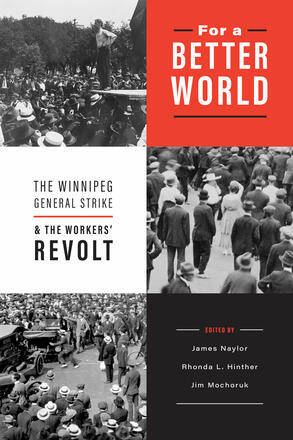
For a Better World
The Winnipeg General Strike and the Workers' Revolt
Categories: History, Canadian History, Political Science, Urban Studies, Planning & Architecture, Urban Studies
Publisher: University of Manitoba Press Show Edition Details
Ebook (EPUB) : 9780887550218, 408 pages, September 2022
Paperback : 9780887552991, 408 pages, September 2022
Hardcover : 9780887550881, 408 pages, September 2022
- A page list enables users to coordinate their reading with a statically paginated version.
- Index provides links to item references.
- Short alternative textual descriptions.
- Contains a table of contents that provides direct access to all chapters of the text via links.
- Single logical reading order.
Table of contents
Introduction
Ch 1 “Strike or Revolution” Redux: The Historiography of the Winnipeg General
Ch 2 In the Water: Race, Empire, and the Winnipeg General Strike
Ch 3 From Patriotism to Insurgency: The Shifting Allegiances of Winnipeg 1919’s Striker-Soldiers
Ch 4 Winnipeg Jews and the General Strike: “Adapt to the Institutions and the Manners of the Country”
Ch 5 The Edmonton General Strike
Ch 6 The Winnipeg General Strike in the Crowsnest Pass
Ch 7 Montréal’s Civil War: The Municipal Workers’ Strike of 1918
Ch 8 “Justice and Not Charity Should Be Your Demand!”: Montréal’s Unemployed and the Workers’ Revolt
Ch 9 The Kansas City General Strike: Wartime Solidarity in the American Midwest
Ch 10 The Seattle General Strike: Five Days that Matter
Ch 11 The Storm Before the Calm: Social and Political Upheaval in the Western Hemisphere
Ch 12 The Rural Nothing Worth Monkey Police, or the Winnipeg Origins of 100 Years of Canadian State Spying on Labour and the Left
Ch 13 Not by Repression Alone: Defeating the Workers’ Revolt by False Promises of Reform
Ch 14 Remembering 1919: Commemoration and the Winnipeg General Strike
Ch 15 Putting History to Work: Public History and Commemoration
Ch 16 The Winnipeg General Strike in the Twenty-First Century
Description
Canada’s largest and most famous example of class conflict, the Winnipeg General Strike, redefined local, national, and international conversations around class, politics, region, ethnicity, and gender. The Strike’s centenary occasioned a re-examination of this critical moment in working-class history, when 300 social justice activists, organizers, scholars, trade unionists, artists, and labour rights advocates gathered in Winnipeg in 2019.
Probing the meaning of the General Strike in new and innovative ways, For a Better World includes a selection of contributions from the conference as well as others’ explorations of the character of class confrontation in the aftermath of the First World War. Editors Naylor, Hinther, and Mochoruk depict key events of 1919, detailing the dynamic and complex historiography of the Strike and the larger Workers’ Revolt that reverberated around the world and shaped the century following the war. The chapters delve into intersections of race, class, and gender. Settler colonialism’s impact on the conflict is also examined. Placing the struggle in Winnipeg within a broader national and international context, several contributors explore parallel strikes in Edmonton, Crowsnest Pass, Montreal, Kansas City, and Seattle.
For a Better World interrogates types of commemoration and remembrance, current legacies of the Strike, and its ongoing influence. Together, the essays in this collection demonstrate that the Winnipeg General Strike continues to mobilize—revealing our radical past and helping us to think imaginatively about collective action in the future.
Awards
- Short-listed, Carol Shields Winnipeg Book Award, Manitoba Book Awards 2023
- Short-listed, Margaret McWilliams Book Award for Scholarly History, Manitoba Historical Society 2023
Reviews
An important advance in scholarship on the Winnipeg strike and broader labour unrest in the late 1910s, For a Better World is also an example of how the diverse approaches and perspectives that often characterize edited collections can be a strength."
- Shannon Stunden Bower
"The editors have skilfully woven together historical inquiries that move beyond the superficial analysis of what happened [during the conflict of 1919], and why, to a more critical look at who has been left out of the historical conversation, what has changed (if anything) and how local struggles for social justice don’t occur in political vacuums. For a Better World asks the reader to contemplate on what it might take to make a more just society."
- Matt Henderson
"This diverse collection of essays… effectively complicates the historical record, adding the stories of Indigenous peoples, soldiers, Jews, popular memories and local unrest to the literature. [For a Better World] highlight[s] issues that should continue to animate discussions and debates about social change more than 100 years later. It is an excellent read."
- Roberta Lexier
"For a Better World is notable for its chapters on other disputes that took place around the same time as Winnipeg's. Various authors describe events in Seattle, Kansas City, Montreal, and Edmonton, showing strong parallels in grievances and militancy among workers, despite their geographic separation."
- Victor Rabinovitch